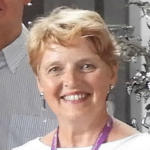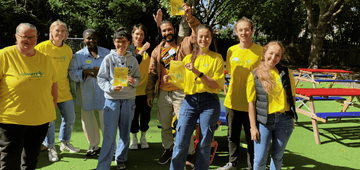
Wendy Hislop, Healthy Living Manager at Southampton Healthy Living, reflects on how the Level 2 Award for Improving the Public’s Health can help to engage the wider public health workforce.
At Southampton NHS Trust on 30 July 2018, we were delighted to have RSPH's CEO Shirley Cramer at the celebration event to present the certificates to the successful candidates who recently took the RSPH Level 2 Award for Improving the Public’s Health.
Back in February 2018, 12 participants and three trainers started on the journey of working to achieve the award with a shared desire to see the wider public health workforce equipped and developed to present an informed, coordinated and proactive approach to improving health in the city, particularly in some of our most deprived communities.
Our 12 participants came from a wide range of community and statutory organisations, each presenting with their own personal and career aims. The diversity provided some insightful discussion and personal experiences towards greater understanding of the life challenges faced by the communities served, and alliances were formed that we hope will bear significant outcomes for them.
The diversity was also reflected in the variety of topics selected for the Unit 4 individual research module. Of the twelve participants, five were apprentices with the Saints Foundation representing the local football club, young people dedicated to bringing new motivation to groups of older people for improved activity levels and reducing isolation.
Three of the apprentices took the lives of older people as their area of focus, looking at improvements to improve their quality of life around dementia, falls and social isolation. Social isolation was also the area of interest for others. The two local community trust’s staff looked at isolation from the point of view of new communities, highlighting the particular cultural and language difficulties that result in poor mental health.
The housing association participant looked at the practical steps her team could introduce to combat the loneliness faced by single men in midlife with poor diets and high alcohol consumption. Taking mental health but from a different perspective, one participant took the high suicide levels in Southampton and explored options for arresting the decline of victims before they arrived at this solution.
Three participants chose to investigate the public health issues around young people, focusing on self-harm amongst girls and young women, alcohol and teenage pregnancy, while two from community sports organisations selected to look at how adults could become more physically active from a general perspective to a more specific approach to adults with disabilities.
So what happens next? We could sit back knowing that these dedicated staff will take this forward themselves especially in respect of their projects, but we feel we now have a sufficient bond with this group that we can expect more from them in future. We hope to set up a network of ‘influencers’ who will, through their daily contact with communities living with challenging situations, be reference points for healthier lifestyles and be able to support people to look for solutions for improved wellbeing. We are very optimistic.
The course has opened up opportunities for these participants and allowed us to develop synergies with their organisations. I hope others across the UK will see this, as we do, as a positive step to engaging a wider workforce in public health.



